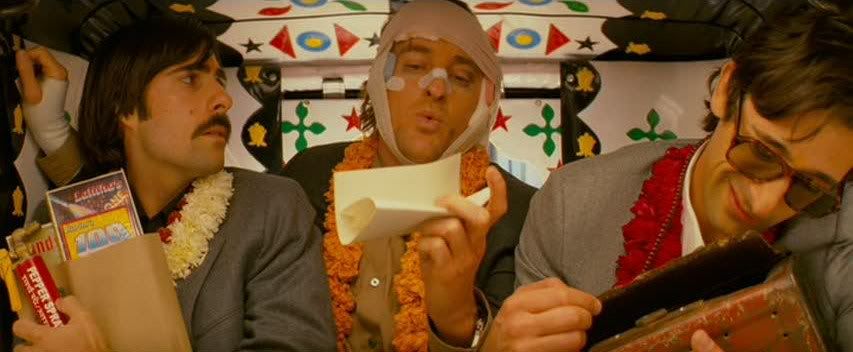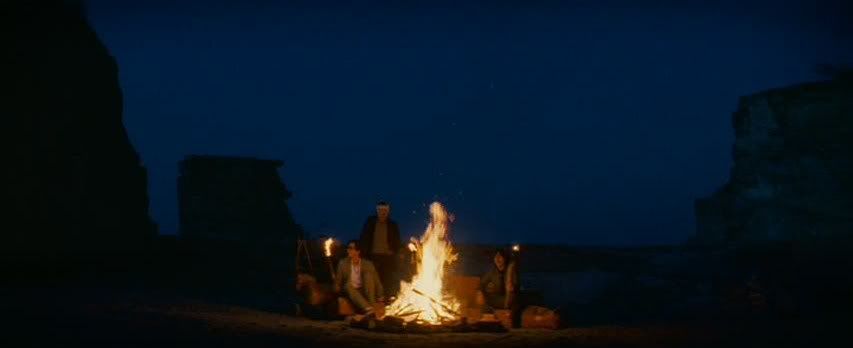
The Darjeeling Limited, Wes Anderson's fifth film, is built around a metaphor so blunt and on-the-nose, so obvious, that it's either ridiculous or brilliant. A trio of brothers — Francis (Owen Wilson), Jack (Jason Schwartzman) and Peter (Adrien Brody) — have been feeling lost and aimless following the death of their father. They meet up a year later in India, taking a trip around the country while lugging around the huge collection of luggage left behind by their father after his death and divided amongst the three brothers. Yes, they're carrying around the baggage of the past, the baggage that represents their relationship with their father, with their distant, flighty mother (Anjelica Huston), and with each other. It's fairly naked symbolism, handled with Anderson's characteristic wit and attention to detail. The luggage — all matching pieces in orangish brown with fanciful designs and their father's initials embossed on the cover — stands for everything that's preventing these brothers from functioning properly, as people or as brothers.
Jack is plagued by a troubled relationship with his ex-girlfriend (Natalie Portman), whose continuing hold on his mind and emotions is demonstrated in the short film, Hotel Chevalier, that serves as "part one" of The Darjeeling Limited. Peter is running away from his pregnant wife, afraid to face the responsibility of fatherhood even though he says he loves his wife; it's obvious that he's been scarred by his experience of family life and doesn't think he can handle a new family of his own. Francis, for his part, got in a car accident and spends the entire film in bandages; he lets slip only late in the film, in that typically offhand Anderson way, that he crashed on purpose, meaning to kill himself. Before that, he takes his bandages off and observes his still scarred face, dryly noting, "I guess I still have some healing to do." It's the kind of dual-meaning line that is perhaps a little too pat, a little too direct in its resonances. Like the use of the dead father's baggage as a metaphor for, well, baggage, lines like this make the film's themes — recovering from the past, the wounds caused by family, the struggle to come to terms with one's self — seem like Hallmark sentiments, too cute and clever to really cut deeply the way Anderson no doubt intends.
That's an accusation lobbed at Anderson's cinema in general, of course, but The Darjeeling Limited seems to take this particular aspect of his work to an extreme that's a bit hard to take. When the three brothers try and fail to save an Indian boy from drowning in a river, it's a turning point in their relationship and in their vision of themselves, a moment when they finally experience something beyond themselves, beyond their egocentric fascination with their own small problems. It should feel monumental and sad; instead, at the funeral for the boy, Anderson shoots the three brothers walking in slo-mo through a scenic panorama, while a jaunty Kinks tune plays on the soundtrack. It's a favored device for Anderson, whose use of music is generally impeccable, but here the tone is all off. He doesn't seem to have the gravitas to handle a moment like this, which is odd from the director who treated the attempted suicide of Luke Wilson's character in The Royal Tenenbaums — set to Elliott Smith, a perfect choice — with a raw energy and intensity that is much missed here. None of this film's characters or situations have that same weight or impact, perhaps because they too easily descend into the kitschy, finicky excesses that mark Anderson's worst moments as a director.

None of this is to say that The Darjeeling Limited is a complete failure, because it's far from it. It's simply the first Wes Anderson movie where the long-held complaints of his detractors seem appropriate. The movie is never less than enjoyable, but it's also a bit hollow, a bit superficial, especially in its treatment of the entire country of India and all its people as a symbolic background onto which these troubled white men can write their own problems and insecurities. To some extent, the film mocks this kind of outlook, particularly in the way the obsessive, detail-oriented Francis plans out an entire step-by-step itinerary for their supposedly spiritual journey. It's like they see the route to enlightenment and self-fulfillment as a process that comes with written instructions, that they can simply follow the steps and they'll be reborn. India is thus just a background for them, a symbol of purity and spirituality, a whole country that they can use to help them become better people. It would be a potent critique if Anderson wasn't often guilty of the same thing, using the scenery and the people as props, especially in the funeral scene, in which the death of this boy merely serves as a way of forcing these brothers, finally, to deal with the death of their father, whose funeral is intercut as a flashback into the funeral of the Indian boy.
Still, The Darjeeling Limited does have many of the charms and pleasures of Anderson's better work, as his usual eye for detail results in many subtle interconnections. He uses objects to probe character and set up events better than anyone, as in the scene where the three brothers begin buying things at an outdoor market, and these objects (Peter's shoes and snake, Jack's mace) resonate throughout the rest of the film, triggering various incidents and adding to the richness of the film's texture. The film is centered around objects, and some of the best scenes involve the brothers bickering over the things their father left behind. Peter, in his grief, has been gathering up various small reminders of their father and using them for himself: sunglasses, a razor, a lighter. This doesn't sit well with Francis, who keeps making a gift of and then demanding back a ridiculously expensive belt which Peter finally throws at his brother's already-wounded face. The scene culminates in a hilarious, out-of-control, nearly slapstick chase/fight when Jack gets some use out of the pepper spray gun he'd bought in the market.
Anderson also gets a lot of comic mileage out of Jack's writing, which Jack insists is fictional even though his brothers read it and recognize direct autobiographical accounts of their own lives. This pays off at the end when Jack reads aloud from a story that, in fact, is a direct translation of some dialogue from Hotel Chevalier, and he finally admits that his stories are factual. Like most of Anderson's best moments, it's both funny and poignant, a reflection of this character's continuing obsession with the past. It's also one of several callbacks that more or less validates the function of the slick Hotel Chevalier, which doesn't stand alone from its companion film very well at all. There's definitely an undeniable kick, though, when Jack in Darjeeling Limited turns on his iPod to a certain Peter Sarstedt tune that is, apparently, his seduction music of choice.
This film suggests how thin the line is in Anderson's cinema between deeply felt emotionalism and a mere accumulation of mannered tics. The Darjeeling Limited crosses back and forth across that line several times, occasionally mining the same moody, complicated depths as Anderson's other features, but more often coming across as a shallow imitation of his best work.








0Awesome Comments!